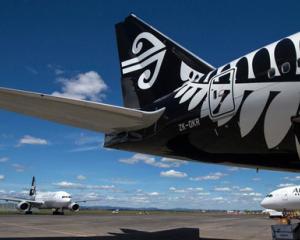Air New Zealand chief executive Rob Fyfe said the airline "won't make money" in the six months to June 30, but flights will be full during the Rugby World Cup.
He was speaking on Bloomberg Television, where he said demand for "cuddle class" seats available on some Air New Zealand long haul flights has been 20 to 30 percent higher than standard economy seats.
The airline has been affected by the earthquakes in Christchurch and Japan and floods in Queensland.
Mr Fyfe said the period from January to June was the toughest he had experienced in his six years as chief executive. "We won't make money in this half year," he said.
In September and October during the rugby tournament the airline would have "absolutely full aircraft" and this would be worth potentially $30 to $40 million to the bottom line.
The company wanted to keep its lie-flat economy seat technology "exclusive for longer", Mr Fyfe said.
The airline's new Boeing 777-300 aircraft have seats that retract and flaps come up to meet the seats in front, allowing couples to lie flat in economy class. The seats have been called "cuddle class".
Mr Fyfe said last year that he was hopeful that the airline would be able to license intellectual property for the seats.
The airline reported normalised earnings before taxation are $112 million for the six months ended December 31, including an $18 million gain on equity swaps relating to the investment in Virgin Blue.
The airline is 75 percent owned by the Government, which has signalled plans to reduce the stake, while maintaining a majority holding.
Air New Zealand has formed an alliance with Virgin Australia on routes across the Tasman which allows the airlines to share revenue and offer reciprocal frequent flyer benefits and lounge access.
Air New Zealand carried 1 million passengers during April, 5 percent more than last year. Revenue passenger kilometres were up 2.9 percent and capacity decreased by 0.6 percent. The group load factor increased by 2.9 percentage points.
It has been reported that Mr Fyfe could step down within 18 months.




